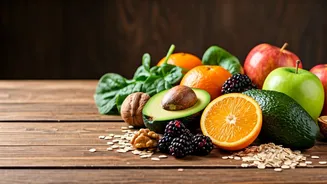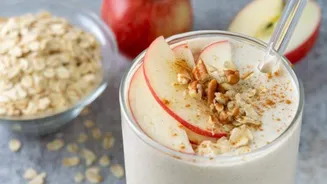Oats: Start the Day
Oats are a nutritional powerhouse, providing soluble fiber that effectively reduces cholesterol levels. This type of fiber binds with cholesterol in the
digestive system, preventing its absorption into the bloodstream. Regularly incorporating oats into your diet can lead to a noticeable decrease in LDL (bad) cholesterol. A simple serving of oatmeal for breakfast, with the addition of fruits and nuts, is an easy and delicious way to begin your day with a heart-healthy boost. Over time, this dietary habit can significantly improve your cardiovascular health, contributing to a healthier lifestyle and reduced risk of heart-related complications.
Nuts: A Crunchy Boost
Nuts, particularly almonds, walnuts, and pecans, are packed with heart-healthy fats and fiber, making them excellent choices for cholesterol management. These nuts help to lower LDL cholesterol while also providing essential nutrients like vitamin E and magnesium. A handful of nuts as a snack can be incredibly beneficial, providing a satisfying crunch and a boost of energy while contributing to better heart health. Consuming a variety of nuts regularly can help you keep your cholesterol in check and reduce your overall risk of cardiovascular diseases. Incorporating nuts into your daily diet is a simple yet powerful step toward a healthier heart.
Beans and Legumes
Beans and legumes, such as lentils, chickpeas, and kidney beans, are rich in soluble fiber. This high fiber content is key to lowering cholesterol levels because it binds with cholesterol in the digestive system, preventing its absorption. Adding a variety of beans and legumes to your meals can be a great way to boost your heart health. Whether you add them to soups, salads, or main courses, they contribute to a feeling of fullness and offer several health benefits. By incorporating more beans and legumes into your meals, you can effectively reduce LDL cholesterol and improve your overall cardiovascular health, reducing the risk of heart-related issues.
Fatty Fish: Omega Power
Fatty fish, including salmon, mackerel, and sardines, are loaded with omega-3 fatty acids. These essential fats are renowned for their ability to reduce triglycerides, lower blood pressure, and improve overall heart health. The benefits of including fatty fish in your diet are numerous. Eating it a couple of times a week can significantly improve your cardiovascular well-being. Moreover, the omega-3s in these fish can also help to raise HDL (good) cholesterol levels, further contributing to heart health. Regularly consuming fatty fish is a delicious and effective way to support a healthy heart.
Fruits: Apples and Citrus
Certain fruits, particularly apples, citrus fruits like oranges and grapefruits, and berries, are excellent sources of soluble fiber, especially pectin. Pectin helps in lowering cholesterol by binding with it in the digestive tract, preventing absorption into the bloodstream. These fruits also provide essential vitamins and antioxidants that protect the heart from damage. Integrating these fruits into your daily diet is a simple and tasty way to support heart health. Whether enjoyed as snacks, in smoothies, or as part of your meals, these fruits contribute to lowering cholesterol and enhancing overall cardiovascular health, making them ideal choices for a heart-healthy diet.
Vegetables: Fiber Rich
Fiber-rich vegetables, such as spinach, carrots, and Brussels sprouts, play a vital role in reducing cholesterol levels. They contain soluble fiber, which helps to bind cholesterol in the digestive system, reducing its absorption into the bloodstream. These vegetables also supply essential vitamins and minerals that support overall health. Incorporating a variety of vegetables into your meals is a simple way to boost your heart health. Whether steamed, roasted, or added to salads, they make a valuable contribution to your daily diet. Eating fiber-rich vegetables regularly can help lower cholesterol levels and promote cardiovascular wellness, offering numerous health benefits.
Plant Sterols
Plant sterols and stanols, found in some foods and fortified products, are naturally occurring substances that can help lower cholesterol levels. These compounds work by blocking the absorption of cholesterol in the gut, leading to a reduction in LDL cholesterol. Adding plant sterols to your diet can be beneficial. Many foods, like fortified orange juice and yogurt, are supplemented with plant sterols. Regular consumption of these foods is an effective way to help manage cholesterol levels and improve heart health. Integrating plant sterols into your diet is a proactive step towards better cardiovascular health and a reduced risk of heart-related conditions.





















